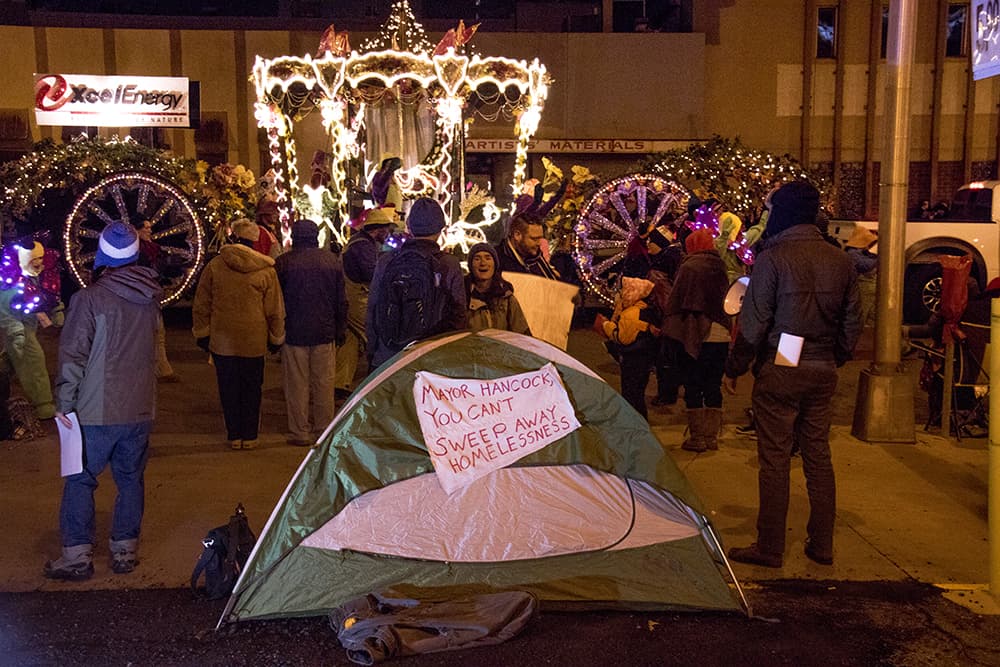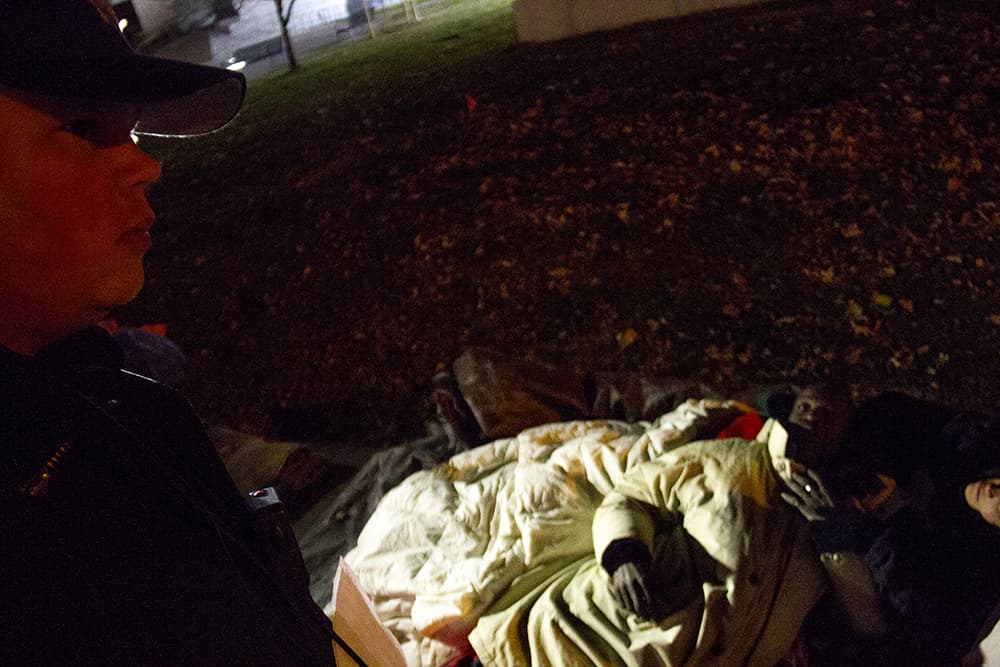
It's about to get really cold for the first time this year. In response, Denver has added 120 sleeping spots to its emergency shelter and transportation to help people get from service agencies in central Denver to the overflow shelter at I-70 and Peoria.
But what some homeless people want is their stuff back -- gear the city took when it cleared people out of the "Triangle" near Park Avenue West and Broadway -- so they can make it through the night on their own.
And for the people who protested the sweeps by camping in front of the City and County Building last week and got camping tickets for their trouble, that gear isn't just in an impound lot with limited hours, it's being held as evidence against them in their camping cases.
"The city needs to stop this," said Ray Lyall of Denver Homeless Out Loud. "They are killing people. People are dying. ... It's not a camping ban. It's a survival ban."
For people whose belongings have been taken and those who haven't, the city has a simple message: Come inside.
"Especially with the weather getting cold, we do not want people sleeping outdoors," said Julie Smith, a spokeswoman for Denver Human Services. "It is really dangerous. Please seek shelter. We will have search and rescue out. We have transportation. We have expanded shelter space.
"When we get into these bitter cold nights, those are the nights where we really want people to come in, and we can take care of whatever needs they have," she continued.
The city and various social service agencies provide shelter to between 1,400 to 1,500 people on a typical night and will be able to make space for up to 1,800 people during very cold weather, Smith said. No one has been turned away for lack of space this year, and if the city has to, it will open recreation centers to make more space.
Here's what's available for single homeless men for the near future:
- An extra bus will make two runs to the overflow shelter from the Salvation Army Crossroads, 1901 29th St., starting at 6:30 p.m. That's in addition to the regular transportation from the Denver Rescue Mission's Lawrence Street Community Center.
- Morning trips will bring men to the Lawrence Street Community Center.
- Bedding and staffing have been increased at the Peoria site to accommodate more people.
For women, families, people who are transgender and teenagers, a full list of options is available here. And if that's too much to wade through, call 211 if it's between 7 a.m. and 7 p.m. Monday through Friday. After hours and on weekends, call the Colorado Crisis Line at 844-493-8255 or text “Talk” to 38255.
Not everyone wants to go.
Lyall notes that what the city calls "beds" are in many cases not actual beds but places on the floor to sleep in large rooms with hundreds of other people.
"Call it a kennel," he said angrily. "Don't call it a shelter. That's why we don't want to go."
While we're on the subject of terminology, the city doesn't want us to call moving people off the sidewalk and confiscating their stuff "sweeps."
"The city is not 'sweeping' people off the streets, we are simply working to keep areas clean and safe for all residents while also working to understand the challenges faced by those on the streets so that we might connect them to shelter and housing," Jenna Espinoza, a spokeswoman for Mayor Michael Hancock, wrote in an email. "For example, we've connected 995 people to housing in the last 23 months in Metro Denver."
We're going to keep using "sweeps" because it's common American vernacular.
Cathy Alderman, vice president of communications and public policy for the Colorado Coalition for the Homeless, said it's true that Denver has enough sleeping space for the homeless, but there are good reasons people don't always want to go. Couples have to split up. People can't take their dogs. There isn't anywhere to store belongings that in some cases people rely on to get by. There's no privacy. Some people don't feel safe in the shelters.
There needs to be more housing, and there also needs to be other types of shelter, Alderman said.
Smith said the city is aware of those problems and is working to address at least some of them at a warehouse in Sun Valley that it's converting into a new overflow shelter that will allow more dignity for guests.
"We will be the first to say mats on the floor are not ideal," she said. "We really want to move away from mats on the floor, but it will take some time."
At a City Council meeting Monday, homeless activists and their supporters called for the city to suspend enforcement of the camping ban and provide a designated area where people can lawfully sleep outside.
Terese Howard, an activist with Denver Homeless Out Loud, expressed frustration at being asked by city officials for solutions.
"Mass homelessness didn't start because of homeless people," she said. "Our housing crisis created mass homelessness. Individuals don't create mass homelessness."
Sophia Lawson, who works in outreach for the St. Francis Center, said the disruption of the sweeps has caused at least four people to miss mental health appointments and numerous others to miss appointments for housing placements. Other people have lost documents, sometimes not for the first time, and getting replacements can take as long as nine months.
Smith said the city can't just let people camp on the public right of way in freezing temperatures.
"We hear from people, 'We just want to be left alone,'" she said. "Is that really what we want as a city, for our citizens to be sleeping on a cold hard sidewalk when it's 10 degrees? I can say from the city's perspective, the answer is a resounding no."

Some homeless people may take their camping tickets to trial.
Denver police mostly don't issue summonses for camping. They generally give a "move along" order, which can't really be contested. But now three people have five tickets between them. Lyall said he expects the people who were ticketed to go to court, and Denver attorney Jason Flores-Williams, who is representing several homeless defendants in a suit related to how their belongings were handled in earlier sweeps, said he's heard from two potential clients, whom he will represent pro bono.
The American Civil Liberties Union of Colorado challenged Boulder's camping ban, but a divided Colorado Supreme Court declined to hear the case in 2011, effectively upholding Boulder's ban. The Denver City Council passed its camping ban the following year, and no one has pushed a new legal challenge since.
John Krieger, a spokesman for the ACLU of Colorado, said the ACLU is not formally involved in any of the camping tickets yet, and the ACLU as a rule doesn't discuss lawsuits that haven't been filed yet. That said, the legal environment has changed somewhat since 2011. In particular, advocates take hope from a U.S. Department of Justice guidance issued in 2015 in an Idaho case that suggested camping bans are both cruel and unconstitutional. The Idaho case was settled out of court, and that DOJ guidance hasn't really been tested. Nonetheless.
"Since the memo in Idaho, we do think the court might look at the same challenge and the same issues and consider them differently," Krieger said.
Krieger said some advocates suspect the city has been trying to avoid bringing the issue to a head.
"Why have there have been so many move-along orders -- thousands and thousands of move-along orders?" Krieger said. "There is a sense that if the law was on more solid legal and political ground, you would be using it more."
Denver police confirmed that they are holding the belongings of three people who got tickets for camping after disregarding several warnings.
Denver police spokesman Sonny Jackson said officers provide a list of available resources and offer a ride to a local shelter for those willing to go. Officers then provide verbal warnings followed by written warnings.
"If the same person is contacted again within seven days or less of the written warning and are still in violation of the law, they can be issued a citation at which point police can collect evidence to support their case," he said in an email. "Last week, after multiple notifications, we issued five citations to three individuals who refused to comply with officers’ requests. The evidence of the camping violation was seized and placed into the property bureau."
What are those folks supposed to do now that it's actually cold? Lyall said people are scrambling to find new gear. Jackson said he would urge those people to go to a shelter.
"No one wants to respond to a call that someone froze to death," he said. "That's a horrible call."
Jackson said officers will have discretion about taking gear into evidence over the next few days, even if they end up writing more camping tickets.
Repeal of the camping ban likely is a non-starter.
Council President Albus Brooks said after the meeting that the homeless people who came down to speak about their situation were "real" and they were "honest," but they are not in touch with the majority of Denver residents and business owners.
"At my office, I have zero calls about how we're enforcing the ban, and I have 100 calls about how we haven't done enough," he said.











